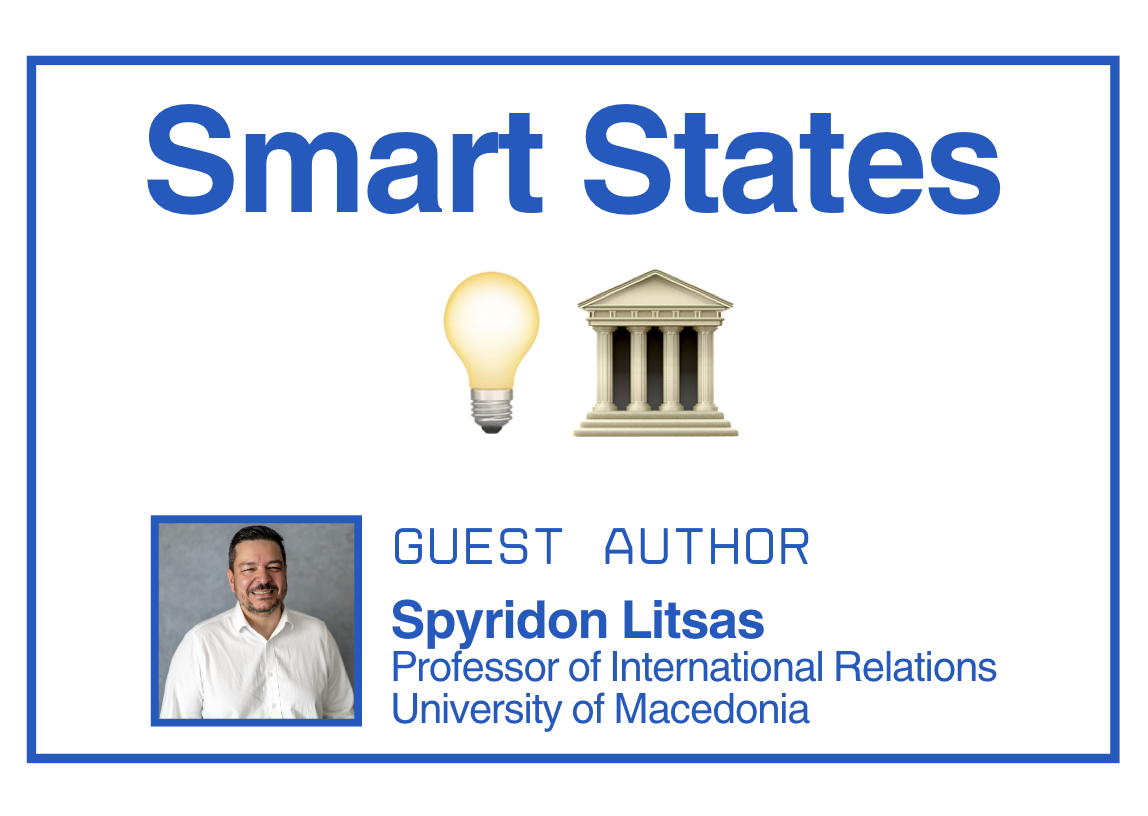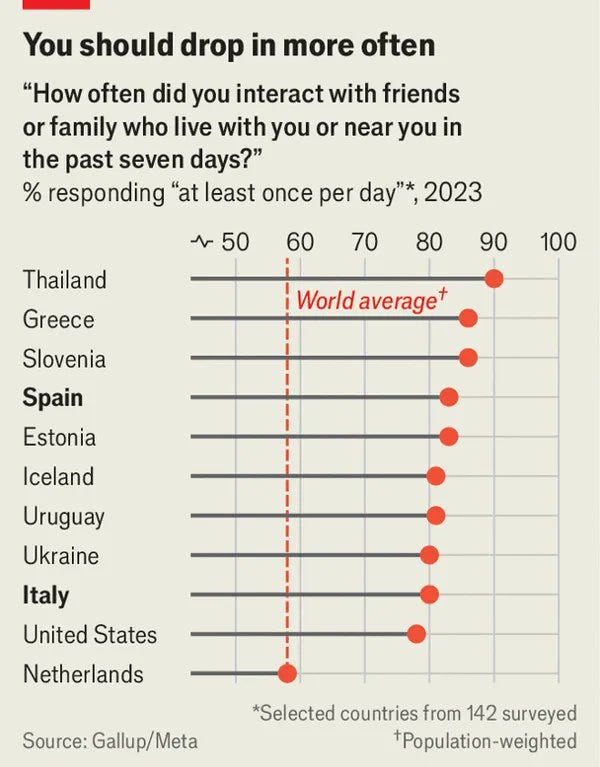Welcome to the 40 awesome new readers who joined in the past week!
If you haven’t subscribed, join 2,375 smart, curious people interested in Changing Greece.
Greetings everyone!
This week, I am honored to share that we have Professor Spyros Litsas from University of Macedonia writing a special article for the newsletter.
Prof. Litsas is an expert in International Relations Theory and Global Strategy. He has deep knowledge of EU affairs and knows the ins and outs of Greek foreign policy well. He often shares his thoughts on (the app formerly known as) twitter.
I am particularly excited about the topic of this week: Smart States.
Smart States Theory is a framework in IR developed by Prof. Litsas, one that has immediate relevance both for the EU at large and Greece specifically.
Greece is gradually seeking a greater strategic role in the EastMed region. It has also started leading more initiatives in an EU that wants to become a more serious geopolitical player. To achieve their goals, both Greece and EU will need to act Smart.
In this piece, Prof. Litsas explains how.
Enjoy!
Note: This is a longer post that usual. Links are as always available below the article.
💡🏛️ Smart States
by
, Professor @ University of MacedoniaIntroduction
What ingredients does a country need to transition from conventional to smart status?
The concept of Smart States, a new framework to understand global power in international relations, can help us answer that.
I first introduced the idea in my 2023 book, ‘Smart Instead of Small in International Relations Theory,” which looks at the main factors defining a smart state and focuses at the United Arab Emirates as a case study. The UAE is one of few states (together with Israel, Norway, USA, Singapore and New Zealand) that epitomize the concept of Smartness in the arena of 21st international politics.
Smart States Theory diverges from the conventional approach of Small States Theory taught in the field of IR:
Small States Theory needs a well-defined definition to what a Small State is. Is it the territory that defines a Small State? Then, is Singapore considered a Small State? If yes, how is it possible to have such a thriving economy compared, for example, with Nigeria or Egypt, two states that do not fit the conventional framework? Is it the population? Then, is Israel a Small State, in other words, less powerful and more fragile than Afghanistan, which has a larger population? Are macroeconomics (at a macro or micro level) what define smallness in this particular theory? If so, during the 100 years of humiliation, would China be considered a small state compared to Norway?
Smart State Theory is based on the premise that in international politics everything is a source of direct and indirect comparison. This comparison is essential regarding each state's unique position on the international power scale, which is regulated by the conduct that each state actor adopts daily to ensure its survival. Positioning is not terminal; states have the capacity, as well as the tendency, to empower their status. The key variable that allows states to climb higher on the international scale is their Smartness, an issue of direct and indirect comparison between all the states of the international system.
But to understand what really makes a State Smart, we will need to dig slightly deeper.
From Smart Humans to Smart States
Since the dawn of time, humans have tried to defend themselves from the hazards of the natural world, improve the way they live and develop sophisticated ways of organizing themselves collectively.
Human history is an unending story of humanity’s attempt to test and escape our Hobbesian condition (i.e. our “natural” state of lacking any government).
As Hobbes argues in Leviathan:
“For all men are by nature provided of notable multiplying glasses, (that is their passions and self-love) through which, every little payment appeareth a great grievance; but are destitute of those prospective glasses (namely moral and civil science) to see afar off the miseries that hang over them and cannot without such payments be avoided.”
Hobbes Thomas, Leviathan, ed. by J.C.A Gaskin (1998), pg. 122
Humans have continuously pushed forward, directly challenging our biological limitations and those of the natural world around us.
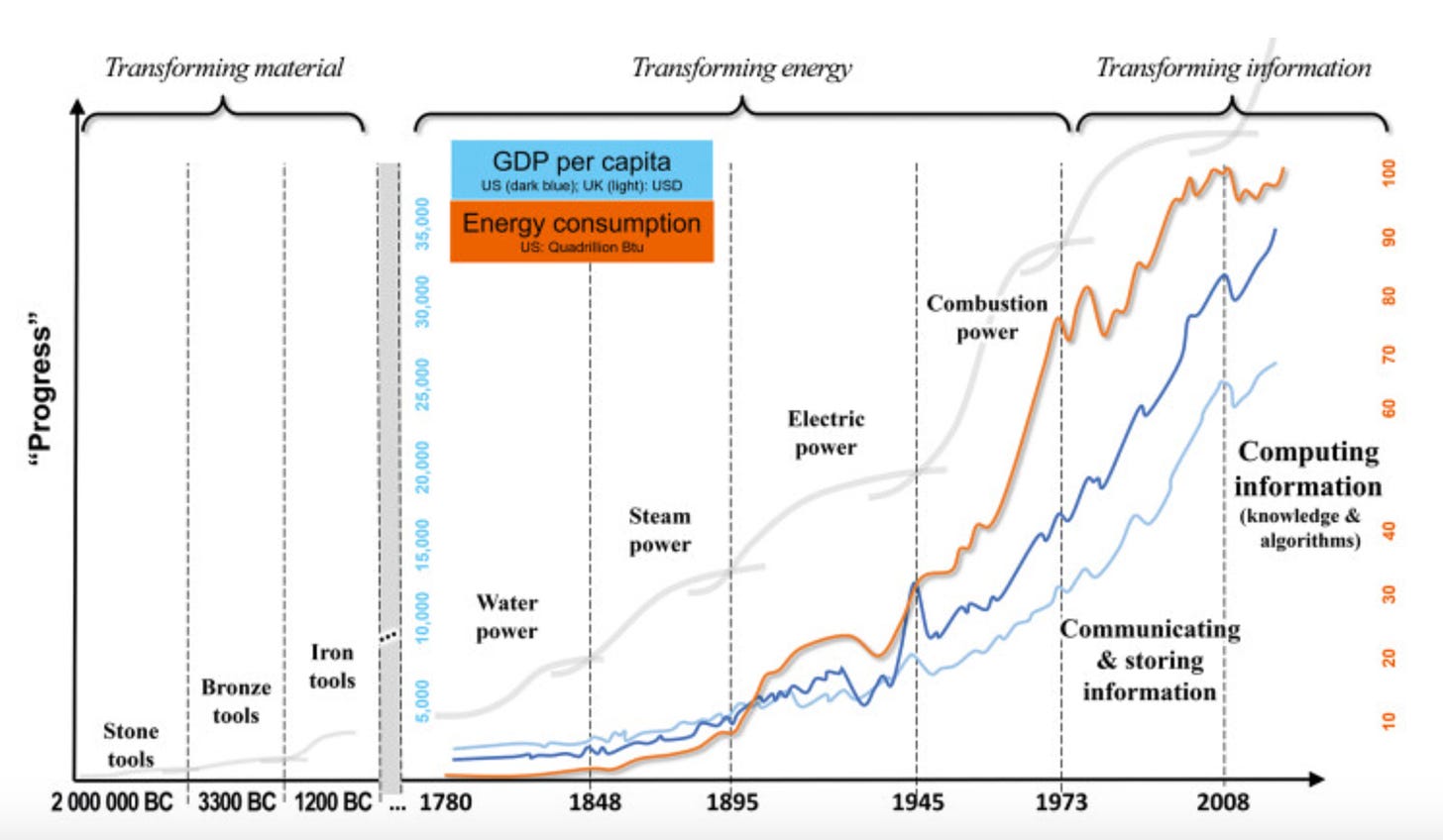
We have tamed Mother Earth, learned how to rule the waves of the ocean and continuously improved the physics behind our mastery of the air (and now space).
In both the jungle of the natural world as well as the societies created by humans, it is not smart to remain static. It does not help our development, it reduces social interaction and it also places us permanently in a passive circumstance of accepting everything in our environment as a given rather than trying to influence it.
The same can apply to States.
The Systemically Perceptive State
Competition is a key part of how states behave in our volatile international world.
Not all state actors can spot this. There are many examples of states which might often fall into the trap of “systemic denial.”
Sleep-walking political elites that have enjoyed the spoils of peace for too long often become oblivious to the pressures of constant interstate antagonism.
Since there is no Deus ex Machina to regulate the international system, states are prepared to exercise any form of deception, and even commit atrocities, in order to survive and promote their national interests. As Henry Kissinger famously said:
“The most fundamental problem of politics is not the control of wickedness but the limitation of righteousness.”
This emphasizes the incompatibility between idealism and the politics of survival.
Idealistically naïve states and their leaders are usually those that disregard the fundamental workings of international politics and the inherent need of states to accumulate power in order to counter the predatory instincts of other states.
History is littered with examples of leaders that failed to comprehend the prevailing sociopolitical/economic realities of their time. This resulted in utter failure. The most notorious such example of a politician whose idealistic naivety almost led his country to ruin is that of British Premier Neville Chamberlain. His policy of appeasement during WWII gave Germany and Italy the space and time to strengthen their position in Europe and very quickly extend their control over the entire continent.
A Smart State is a systemically perceptive state that is always aware of the crucial importance of polarity in the way the international environment evolves.
In unipolar systems, systemic stability is fragile because there is only one dominant international actor and many contenders. This lack of balance encourages revisionist actors or states that hope to implement a hegemonic agenda at the expense of the single chief actor. The main actor is always on its toes looking at every direction.
In bipolar systems, total wars can occur much more frequently than in a multipolar one, mainly because systemic polarization is excessive.
In multipolar systems, antagonism between more than two main competitors prevents a state from fully focusing the entirety of its national capacity and energy against a single opponent. The main actors are forced to distribute their attention and resources to meet challenges from multiple directions.
The multidimensional challenges created by multipolarity make it more stable than either bipolarity or unipolarity.
A perceptive state intelligently observes factors of systemic stability. It understands that preserving its national interest is not a linear endeavor and can change course in both negative and positive directions at any moment in time.
The Anti-Blanche DuBois State
What is one common example of a state that is not a systemically perceptive?
The Blanche DuBois syndrome describes well states that are dependent on the kindness or magnanimity of other states to survive. This has been a common pitfall for many countries in the post-WWII era, especially after the end of the Cold War.
The Blanche DuBois state is one that devotes little attention to strengthening its defensive capabilities or stabilizing the economy, believing that it will be able to counter every geopolitical challenge thanks to the support of its allies.
Blanche DuBois states adopt a passive role, bandwagoning stronger states and handing over sovereign rights to them in exchange for their support or protection.
They have accepted their structural weakness. Rather than developing a long-term plan to address those weaknesses and rebuild themselves on solid foundations, they offer earth and water to other states to continue their peaceful, passive existence.
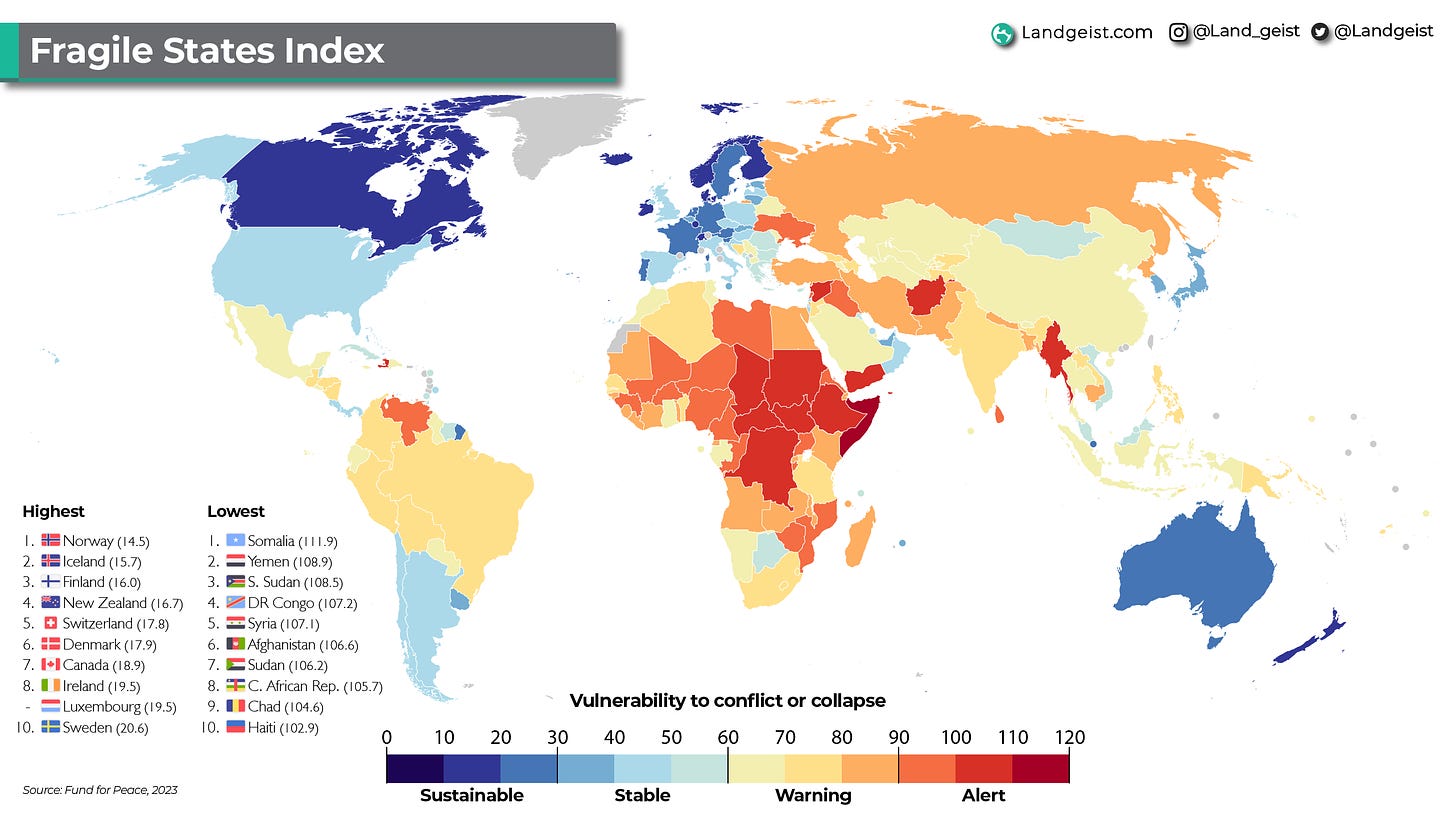
A state may bandwagon even during peacetime when there is no apparent threat. This choice may be motivated by a lack of resources, poor leadership, fragile national unity, or simply by the inadequacy of the country’s political elites.
The Smart State is an anti-Blanche DuBois state. Anti-Blanche DuBois states have the ability and good sense to adopt policies that permit them to stand on their own two feet and ensure their survival through their own capabilities and actions.
Borrowing from the Thucydidean concept of “Self-Help”, the goal here is not to be isolated from the rest of the international system; rather, it is to reduce one’s systemic interdependency.
In an era of asymmetric interdependence, where global politics and the global economy form a vast network of interconnection and “spillover” effects, a state cannot stand alone. Neither can it depend on the kindness of strangers.
The Greek economic crisis of 2010–2019 is a warning of what can happen to states that behave like Blanche DuBois in the international system.
As a member of the EU and the Eurozone, Greece placed itself in a relationship of dependence by stabilizing its fragile economy for decades with European subsidies. As a result of this shortsighted strategy, Greece faced an unprecedented financial crisis, came very close to being forced out of the EU and had to undergo a very strict adjustment program (led by its creditors) to patch itself up.
The bitter lesson learned from the Greek crisis was that no matter how kind strangers are, there comes a point where a country must accept responsibility for its own survival or end up as a failed state.
The Right to the Pursuit of Happiness
What does happiness have to do with international relations?
The Smart State ought to grant its citizens the right to pursue their happiness.
It develops an institutional framework that allows citizens to exploit their skills, cultivate their intellect and be rewarded for their contribution to the advancement of society, the strengthening of the country and human progress in general.
How can a state implement such a policy?

A Smart State invests in the happiness of its citizens, but refrains from intervening in the individual’s daily life, beliefs, values, or practices. It does not dictate what is permissible, what is like-able and what should bring happiness to the people.
Every state that has tried to follow this track, whether Robespierre’s France or Ceausescu’s Romania, has eventually collapsed due to civil unrest. While not a fan of Marx or Engels, I must agree with them that humans who live in slavery and misery will always choose to revolt because the only thing they have left to lose is their chains.
Disaster awaits those states with minimal interest in the happiness of their citizens. Two examples are Ben Ali’s Tunisia and Muammar Gaddafi’s Libya. A Smart State knows it has to offer its citizens the opportunity to pursue happiness by creating a stable political environment and developing a sustainable economic framework.
In modern Scandinavia, the ability of citizens to achieve happiness goes hand in hand with a systemic meritocracy and the state’s collective encouragement of society to be creative and entrepreneurial. There is also a strong safety net in place, guaranteeing the citizens’ right to fail and try again. No wonder Scandinavians are among the happiest people on earth today.
Investment in Tech & Innovation
Technological progress offers any state the opportunity to emerge from its mediocre comfort zone, grow economically and socially, end conventional ways of approaching international politics, and act on the international scene with more gravitas.
The Smart State invests in technology to promote hard power capacity and develop its economic competitive advantage.
A technologically Smart State can reform its public sector by cutting out red tape, reducing public sector expenditure, contributing to a better quality of life and raising productivity. It also contributes to public health and environmental protection since it drastically reduces the consumption of unhealthy products.
A technologically Smart State can more easily deal with (inter)national crises.
One of the main reasons why states like the USA, Japan, Israel, the United Arab Emirates, Australia, and New Zealand were able to control the spread of the pandemic and achieve high percentages of vaccination among its citizens was that their Smart Administration capacity (i.e., the construction of their information technology systems) was sufficiently developed to enable their citizens to adapt to the new conditions created by the pandemic within a short period of time.
States such as India, Turkey, Albania, and Moldavia, with low technological adaptability, faced enormous obstacles under the burden of the COVID-19 pandemic.
A state that invests in technology can train its workforce to acquire new skills and abilities. A skilled workforce guarantees low unemployment, while the national economy is boosted by high innovative production.
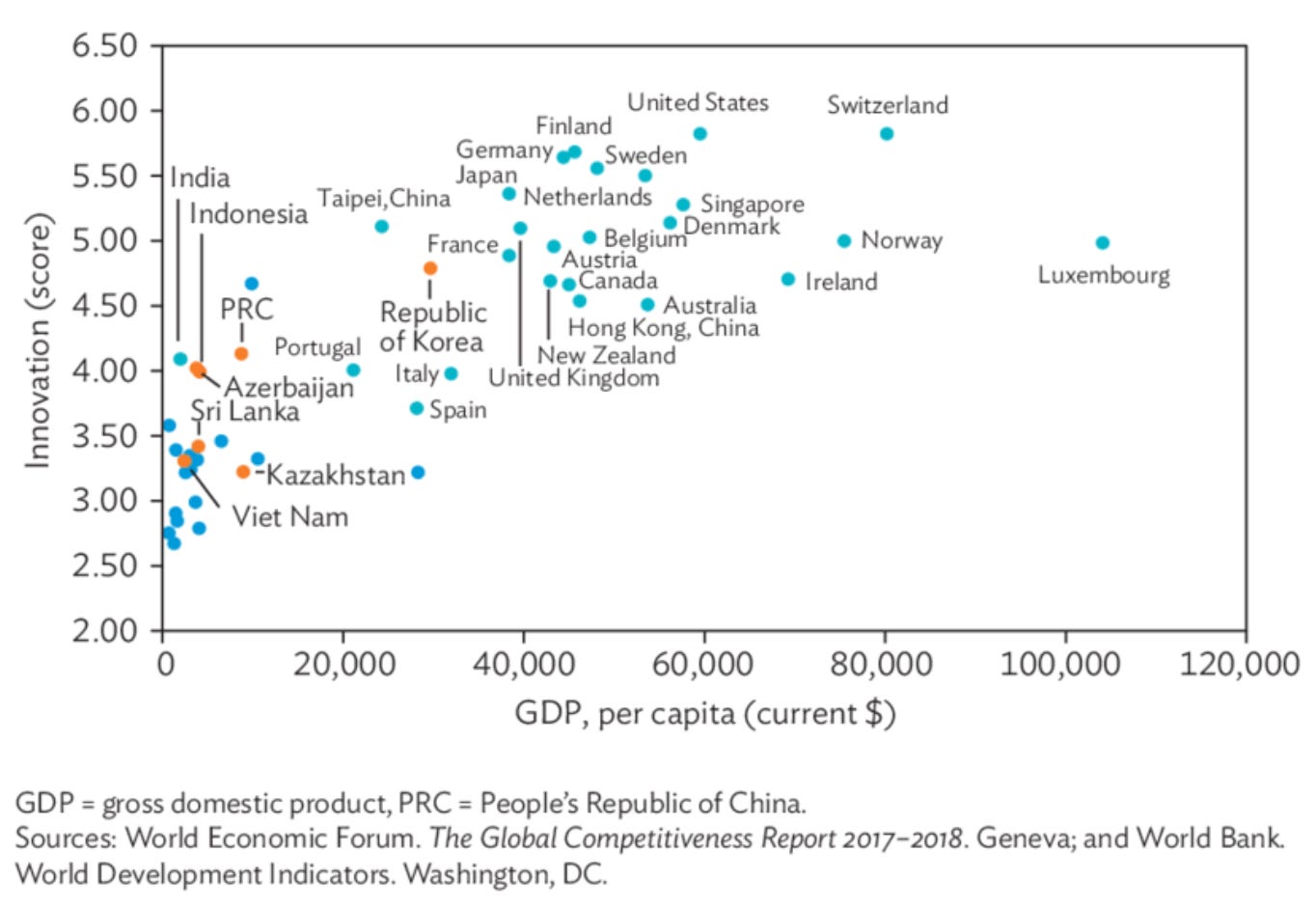
A technologically advanced state has all the necessary means to preserve and promote national prestige, one of the most critical components of success in international politics. Gilpin writes about this,
“Prestige, rather than power, is the everyday currency of international relations, much as the authority is the central ordering feature of domestic society… prestige is ‘enormously important’ because ‘if your strength is recognised, you can generally achieve your aims without having to use it’.”
Source: Gilpin Robert, War and Change in World Politics (1981), pg 31
As Markey rightly comments, in the international arena:
“the thirst for prestige is never entirely quenched.”
Source: Markey S. Daniel, “Prestige and the Origins for War” (1999), pages 169-170
When a nation enjoys significant prestige internationally, even if it is not among the great powers, it will attract positive interest from other states to form alliances.
Last but not least, a nation that invests in technology can attain an advanced level of hard power, giving its citizens confidence that the state is able and willing to meet possible acts of outside aggression.
Progressive Leadership
Smart states are firmly in step with each era’s systemic realities and trends. Most of the time, this is affirmed by the state’s leadership. According to Yukl, leadership is:
“the process of influencing others to understand and agree about what needs to be done and how to do it, and the process of facilitating individual and collective efforts to accomplish shared objectives”
Source: Yukl Gary, Leadership in Organizations (2006), pg. 8
A Smart State has a progressive leadership that is responsive to the changes in the international system and is willing to introduce new trends to the rest of society.

Progressive leadership has to unfold according to the cultural, economic, societal, and technological conditions of its period. It must always be one step ahead, otherwise it risks being trapped in a collective subjectivity of opinions and views.
Progressive leaders understand the responsibilities of governing an organized community, seeing this as a great responsibility rather than just a task or a hereditary right that cannot be evaded. They remember that it is essential to inspire their people.
A leader is not a hermit but someone who gives others the confidence to follow them. This is why a progressive leader must always be in touch with the consciousness of the nation — its tradition, beliefs, ethical codes, and aspirations for the future.
Smart State leadership requires empathy and practicing what you preach. The most prominent example of this was Alexander the Great. A key reason of his tremendous military victories was his ability to inspire his men by leading the cavalry in the first line of battle. He also famously refused to drink water before any of his soldiers did.
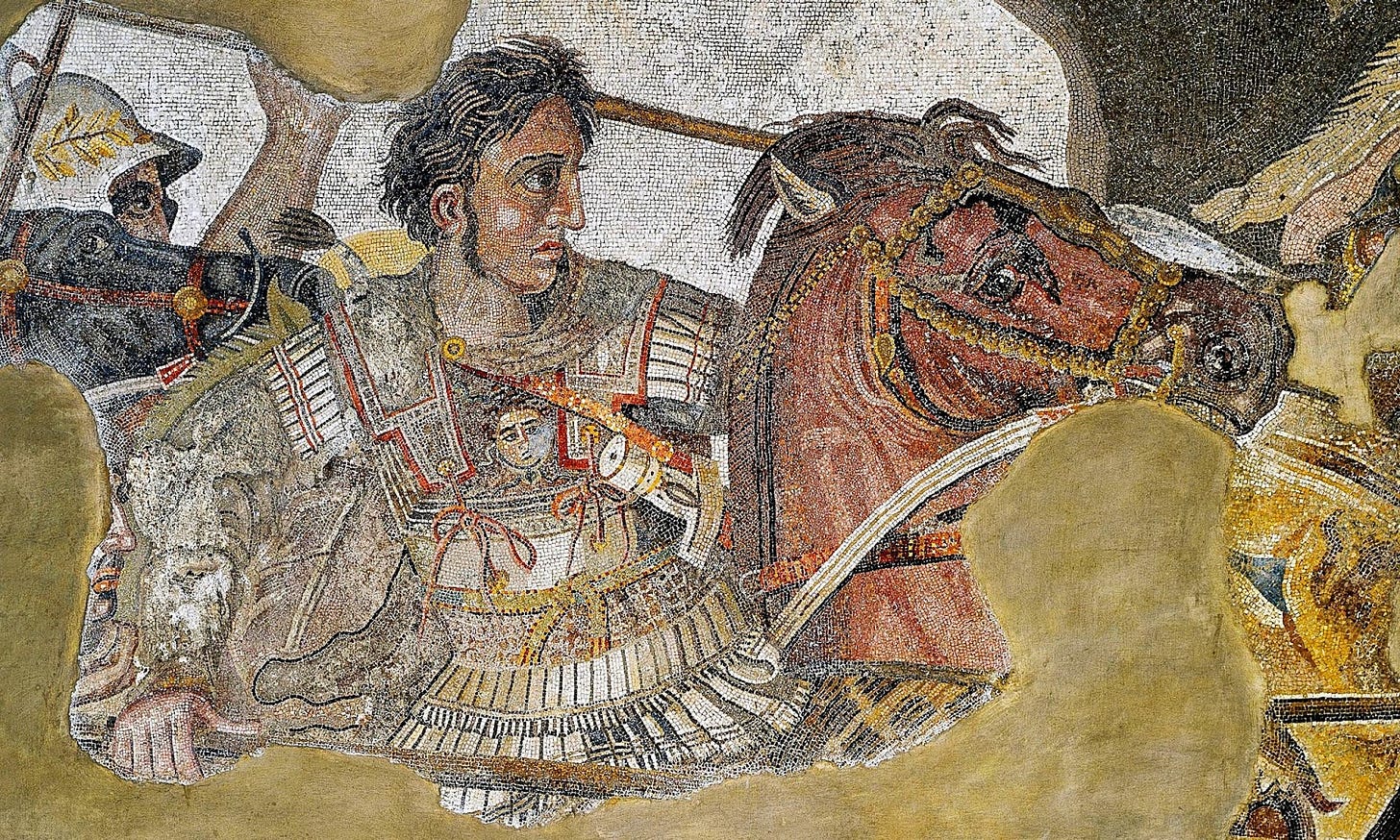
A Smart State leader must not allow themselves to be disgraced. While waiting to be interviewed by the BBC during the Russo-Georgian War in 2008, Georgian President Mikheil Saakashvili started to chew his tie nervously as he listened to news of the advance of the Russian army toward Tbilisi. He was unaware that the camera was rolling, a scene the BBC would broadcast many times in the following days.
The moment the Georgian people witnessed Saakashvili’s psychological collapse was the point where they lost confidence in their leader. The Russians soundly defeated Georgia and Saakashvili faced organized social resistance until he exiled himself a few years later. Today he is in prison, accused of illegally crossing the nation’s borders.
In contrast, the Ukrainian President Volodymyr Zelensky demonstrated a very different approach during the Russian invasion of Ukraine. Very quickly, he managed to get a grip on the situation. Social media became full of Zelensky videos speaking to Ukrainian soldiers, raising their morale while reassuring civilians that he had chosen to remain in Kyiv and face the same destiny as them. Within a few days, Zelensky had become the symbol of Ukrainian resistance to the Russian invasion and someone for whom a great part of the Western world expressed profound admiration.
National Unity
A state’s prospect for survival depends heavily on the collective will of the people.
Ernest Renan, the nineteenth-century French historian, said during his famous “What is a Nation?” lecture in 1882: “a nation is a daily referendum”. In his own words:
“A nation is therefore a large-scale solidarity, constituted by the feeling of the sacrifices that one has made in the past and of those that one is prepared to make in the future. It presupposes a past; it is summarised, however, in the present by a tangible fact, namely consent, the clearly expressed desire to continue a common life. A nation’s existence is, if you will pardon the metaphor, a daily referendum, just as an individual’s existence is a perpetual affirmation of life.”
As cited by Wright L. Jacob, War, Memory and National Identity in the Hebrew Bible, Cambridge: CUP, 2020, p. 209.
The health of every nation lies primarily in its citizens’ willingness to live, produce, create, and die under its banner, which is a mark of their collective desire to co-exist within a specific political and legal framework. This is what national unity is all about. It is the necessary ingredient for a nation’s survival.

A Smart State seeks to create and cultivate a keen sense of national unity.
The more extended and durable the national unity of a state, the better its prospects of meeting challenges that the competitive international system might present.
National unity is manifested daily in the connection between political elites and the people. This daily connection is achieved by making leadership, and the rest of the political system, visible and accessible not only at official events but also in simple, routine happenings that give the heads of the state an air of “normality” and allow the ordinary citizen to connect with them psychologically.
Every political system — whether monarchy, oligarchy, or democracy — that remains hidden behind high walls and rarely opens itself to the public is destined to fail.
During troubled periods, such as war or pandemics, national unity is strengthened when the leadership is seen to be empathizing with the rest of society.

This can often be achieved by the public appearance of leaders after large-scale destruction or loss. For example, on Friday, September 13, 1940, a German raider dropped five explosive bombs on Buckingham Palace. The Foreign Office immediately advised the King and the Queen Consort to flee the country and take refuge in Canada until they were safe enough to return. The reply from Queen Consort Elizabeth became one of the most famous declarations of the Second World War:
“The children will not leave unless I do. I shall not leave unless their father does, and the King will not leave the country in any circumstances, whatever.”
Bovee L. Courtland, Contemporary Public Speaking, pg. 450
But empathy is not enough in itself to preserve national unity. A smart state wishing to promote national unity must also be able and willing to demonstrate compassion.
Compassion is about showing people that a government is capable not only of sharing the sentimental burden of the tragedy that has befallen them but is also exercising efficient post-crisis management, offering more than just a helping hand to those who have suffered and learning from the tragic event to prepare the nation for similar events that might happen in the future.
National unity is strengthened when the state has a solid collective consciousness of safety and order. In other words, when caring for the well-being of citizens is accompanied by successful actions that both encourage and improve societal security.
Unconventional Diplomacy
Smart State diplomacy must be differentiated from the concept of smart defense.
The first promotes the state’s political, economic, and cultural objectives. The latter exclusively pertains to implementing the state’s hard power using hi-tech operational means, hybrid military strategy and its armed forces.
Smart State diplomacy is the combination of a state’s geopolitical, economic, and sharp power that is used by highly skilled, talented and seductive diplomats to promote the nation’s interests, objectives, and goals as fully as possible.

Smart diplomacy does not stop during peacetime.
And during wartime it should always explore possibilities for peace.
Conclusion
We have now established some of the key characteristics of a Smart State.
Let’s bring it closer to home. What would a “Smart Europe” look like today?
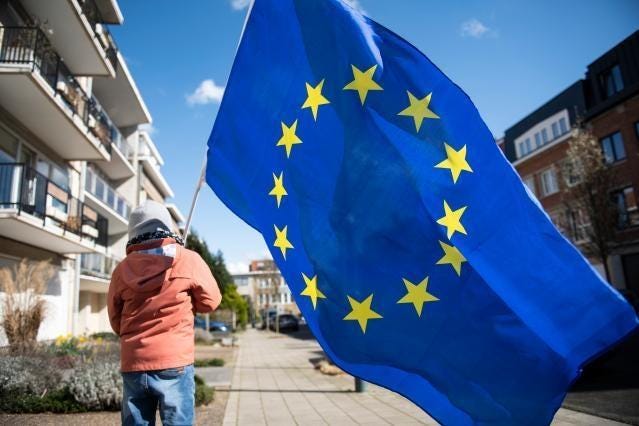
This is – or at least, must be – the ultimate goal of European foreign policy discourse.
A Smart Europe means a deeper Union. To avoid a repeat of history, allowing the EU to share the same fate as the Hanseatic League of the 19th century, it is essential to lead the Union from a monetary pact to a political and economic federation.
A Smart Europe means a continent that is well connected socially and politically with its broader European periphery. It is equally vital for the farmers of Epirus (Greece), factory workers of Lower Saxony (Germany) and fishermen of Galicia (Spain) to be able to see value to collective European regulations instead of looking at Brussels as an impenetrable bubble full of detached political elites.
A Smart Europe means a leader spearheading a new EuroAtlantic agenda. It is very important for the EU to find viable and effective ways to enhance the cooperation between the two sides of the Atlantic in domains beyond just NATO.
A Smart Europe means a more assertive geopolitical player that is both willing and able to play an advanced role in today’s world. A player not afraid to stand its ground.
A Smart Europe means a collection of Smart Member States. Therefore, discussing how to turn countries like Greece into Smart States is not just rational; it is necessary. ‘How can Greece become a Smart State?,’ I was once asked. ‘A good start may be when Greece stops feeling OK calling itself Small,’ I replied.
Words have power. They affect the way we see and conduct ourselves.
Here’s to making Smart part of our foreign policy vocabulary in Europe, and beyond.
And then acting upon it.
🏭 Economy & Business
Bank of Greece projects 2.2% growth for Greece in 2024
Overall turnover in industry sees significant jump in April 2024
Greece mulling incentives for listings and investors in stock market
Greek stock market exhibits seasonal trends, writes
Ferry industry to be investigated for price gauging
Public Group launches new €30M investment plan
OECD Anti-Bribery report sees significant progress in Greece
ADMIE is rolling out big energy projects over the next 2 years
🤖 Tech & Startups
Multi was acquired by OpenAI
Axelera (AI hardware) raised €63.5M in Series B funding
Workearly (edtech) raised €1M in 1st funding round
Athletopia (athletic tech) raised €0.2M in 2nd funding round
Tunic Pay (app fraud) selected as Sifted startup to watch
Greek AI talent recognized by Macropolo as top in Europe
Fresh funds for startups up to €60-80M by MinDev
Daedalus super-computer to be built in Greece for €42M
Startup Pirate reaches 100 issues mapping Greek tech scene
Antonis Danon talks about being an angel/VC in fintech
Greeking Out 2.0 report on Greece’s tech ecosystem is out
🙌 Celebrating Greek wins
Greece wins 17 medals in European Aquatics, comes 2nd in Europe
Region of Western Greece wins Regional innovation Valley award
Yannis Ioannidis re-elected President of the prestigious ACM
Vangelis Dikopoulos wins Qualcomm Innovation Fellowship
📌 Spotlight: Greeks are social creatures
I recently shared this chart from the Economist.
In the US, people usually live to work. In (Southern) Europe, people typically work to live. In my eyes, Greece is an extreme case of that. This used to bother me a lot when I was younger. I felt it showed a lack of ambition and kept our country behind.
The more the years pass, the more I realize that this is actually a healthier lifestyle. Our high level of social interaction is a key ingredient to happiness, but also longevity. It is something that we miss dearly when we live abroad, and often take for granted when back home. I think it is precious and I’ve learned to appreciate it more.
What do you think?
If you’ve read this far and are in Greece this summer, let me know. 👍
Until next time!





